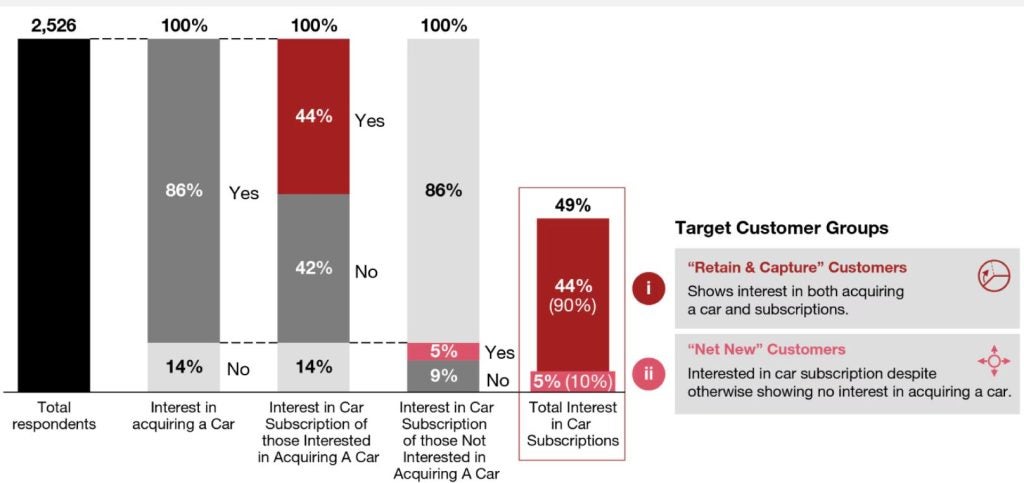Close to half of UK consumers (49%) are inclined towards car subscription models instead of traditional purchasing and financing methods for acquiring a vehicle, as revealed by recent data from PwC.
This innovative approach provides lower upfront fees and flexible, shorter-term commitments compared to leasing. It typically includes added benefits like insurance, digital services, maintenance, and roadside assistance.
Opportunities in the Car Subscription Market
% of respondents

PwC’s study indicates that 44% of consumers intending to purchase a car in the next five years would opt for a subscription model over traditional methods.
Furthermore, 5% of the market comprises ‘net new’ customers: 4% are current car owners not looking to replace their vehicles within five years but open to doing so through a subscription model, and 1% are non-car owners interested in having a car via subscription.
Age is a key factor in subscription interest, with 85% of demand for premium and luxury brands coming from consumers aged 18-44. This age group also represents 61% of the demand for volume brands.
Consumer motivations for selecting subscription services were grouped into three main themes: 38% are ‘vehicle explorers’ seeking flexibility to access new or better cars with shorter commitments; 33% are ‘conscious budgeters’ who prefer an all-inclusive package with a fixed monthly fee; and 29% value the convenience of commitment-light options that reduce administrative burdens and concerns regarding depreciation and battery life.
The PwC survey, conducted from 25 September to 13 October 2023, involved 2,526 UK consumers, including a nationally representative core of 2,000 respondents and an additional 500 EV drivers. The survey covered various ages, incomes, and geographical locations.
Akshara Chandhok, Director in PwC’s Automotive Practice, highlighted the strategic advantage for early adopters of subscription models, emphasizing that companies failing to offer this option risk losing market share. Chandhok noted that one in ten potential subscribers would not otherwise consider acquiring a new car, suggesting that subscriptions could attract new consumers who would otherwise be disengaged.
Chandhok also pointed out the unique dynamics introduced by the shift to electric vehicles (EVs). While many drivers prefer sustainable EVs, the high upfront costs and rapid technological advancements in battery and digital features make subscriptions an attractive, risk-averse option. This model allows consumers to avoid concerns about obsolescence, battery deterioration, and value depreciation.
Cara Haffey, Manufacturing and Automotive lead at PwC UK, added that integrating subscription models into customer lifecycle strategies could help carmakers manage output, costs, and vehicle residual values. Haffey noted that subscriptions could attract customers interested in ‘try-before-you-buy’ EV options or those needing a vehicle for short periods. This approach could also help manage supply more effectively by offering surplus stock for subscription rather than reducing prices or leaving vehicles idle on forecourts.


















